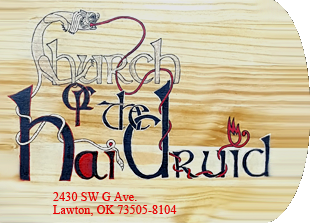Words from the Hai Druid
Acorus Calamus & Spp.
December 27, 2016
I am now addressing another herb that is being hidden from the American public which is used in both Ayurvedic Medicine and Chinese Traditional Medicine. The Chinese Herbalist's Handbook lists over 20 recipes that contain Shi Chang Pu. This herb is known overseas for many uses. It clears nervous tension and dampness of the spleen along with aiding digestion, treating dyspepsia and hyperacidity, and regulates gastrointestinal fermentation. It effectively treats poor appetite and gastro intestinal distension. It is highly regarded in Ayurvedic medicine as an herb that promotes wisdom by improving mental focus. In China it is considered a primary herb for restoring the power of speech after a stroke. They also use it to treat insanity, depression and impaired consciousness. In Ayurvedic medicine, the combination of this herb with gotu kola is a universal tonic for the mind and the nervous system; it increases memory and concentration. If you combine it with cardamon, it helps the digestion of dairy products. AVOID DURING PREGNANCY!!! The standard dosage listed in Planetary Herbology is an infusion or 3-9 grams also a tincture of 10-30 drops. I have tested this herb with a tincture of 30-45 ml and it is quite safe at this level with no hallucinatory effects. (NOTE: multiple testers)
The Rondel Herb Book: Deluxe Edition lists its uses for Digestion, Tonics, Stimulants, Fevers, and dyspepsia. It also notes that this herb is sometimes used as a substitute for ginger, cinnamon, or nutmeg because of its spicy nature. Let alone that it is used in hair and tooth powders and beverages, including beer, bitters, tonics, liqueurs, and cordials. Of course this book was published in 1974, before the government got involved in banning herbs used by Timothy Leary, along with his book.
The current translations and books on Chinese Traditional Medicine lists the Latin name Acori Graminei which differs from other listings, yet still uses the 3-9 gram dosage.
The Yoga of Herbs (An Ayurvedic Guide to Herbal Medicine) states that this herb is currently under F.D.A. Restrictions, not recommended for internal usage and held to be toxic. However, it has been used in Ayurveda for many thousands of years, being one of the most renowned herbs of the ancient Vedic seers. It is a rejuvenative for the brain and the nervous system, it promotes cerebral circulation, increases sensitivity, sharpens memory, and enhances awareness. Listing it as one of the best herbs for the mind. Which could possibly do wonders for MS and other disorders that affect nervous systems and the brain. Possibly even Alzheimer's, if they actually could work with it.
Why is our government so against this herb? Well, it is supposed to cause hallucinations if you eat 10 inches of the fresh root.
In older text like A Modern Herbal, originally published in 1931, does nothing more than confirm everything listed above.
As an old popular song by Moody Blues says, "Timothy Leary is dead!" So why is the government keeping us from knowing about this wonderful addition to our herbal weapons against the diseases and problems humans have currently? Is it because they do not want humans to have wisdom? I can say nothing except "Big Brother does not think we can use it correctly". That, or the Pharmacological industry is keeping this from us because it could cure people, and that is not profitable. Profit is made by continuous treatment, not cures. Whichever way you look at it, the government is trying to protect us from a potential cure. Hmmm, is that really protection or just a payoff?
Disclaimer: "This information is intended for educational purposes only and is not a substitute for the advice of a qualified healthcare professional. Always consult your health care provider before adding herbs to your health regime."
Update: As of June 29, 2021
Not recommended for MS. Highly recommended for strokes, alzheimer's, amnesia, trauma, and especially affixiation poisoning.

